103 Motivational Wangari Maathai Quotes That Show Things In Right Perspective
Wangari Maathai was an eminent Kenyan Noble Prize laureate and environmentalist. She spent a major half of her life fighting for environmental issues. She also became the first environmentalist and African women to receive a Noble Laureate. Besides this she was also the first African women to be awarded a doctorate degree. Maathai earned prestigious positions at ‘University Of Nairobi’ owing to her exceptional academic background and oratory skills. In 1970s she founded the ‘Green Belt Movement’ that was aimed at planting trees in order to protect the environment. As years passed the non-government organization diversified and started focusing on women’s rights as well. She also turned into a political activist towards the latter half of her life. Here is a collection of views, thoughts, beliefs and causes for which she raised her voice in form of quotable quotes. Let us browse through some popular quotes and thoughts by Wangari Maathai that hold a world of wisdom.
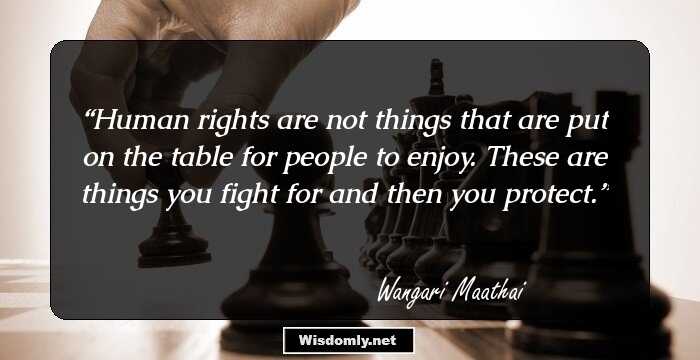
Human rights are not things that are put on the table for people to enjoy. These are things you fight for and then you protect.
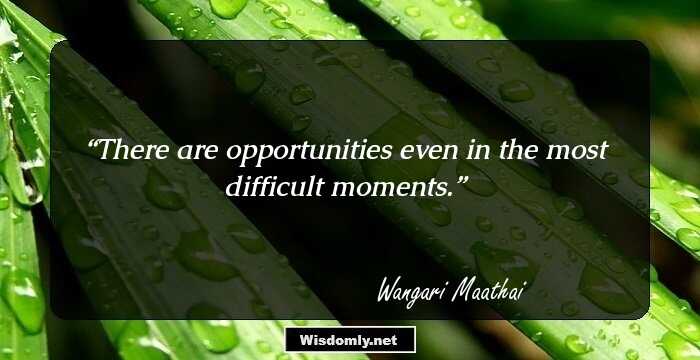
There are opportunities even in the most difficult moments.
I have always felt that perhaps women have sometimes almost embraced the same values as men, and the same character as men, because they are in the men's world, and they are trying to fit into a system that men have created. And maybe in truth when there is a critical mass of women who play that role in governments, then we will see whether women can really manage power in a way that is less destructive than the way that men have used power.
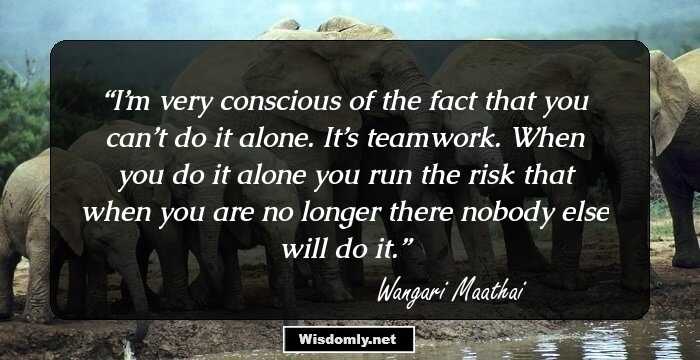
I’m very conscious of the fact that you can’t do it alone. It’s teamwork. When you do it alone you run the risk that when you are no longer there nobody else will do it.
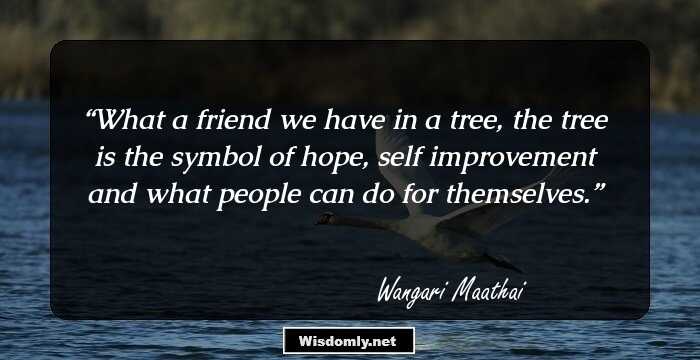
What a friend we have in a tree, the tree is the symbol of hope, self improvement and what people can do for themselves.
Education, if it means anything, should not take people away from the land, but instill in them even more respect for it, because educated people are in a position to understand what is being lost. The future of the planet concerns all of us, and all of us should do what we can to protect it. As I told the foresters, and the women, you don't need a diploma to plant a tree.
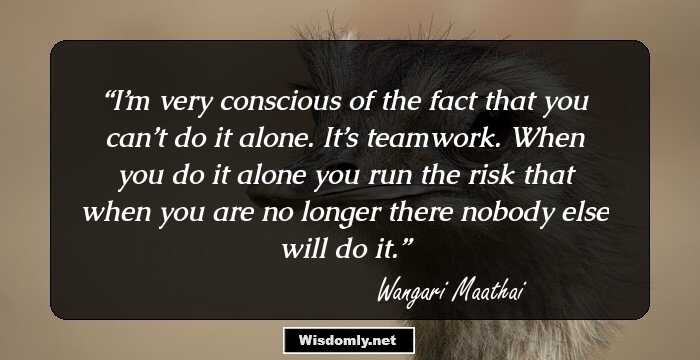
I’m very conscious of the fact that you can’t do it alone. It’s teamwork. When you do it alone you run the risk that when you are no longer there nobody else will do it.
Today we are faced with a challenge that calls for a shift in our thinking, so that humanity stops threatening its life-support system. We are called to assist the Earth to heal her wounds and in the process heal our own - indeed to embrace the whole of creation in all its diversity, beauty and wonder. Recognizing that sustainable development, democracy and peace are indivisible is an idea whose time has come
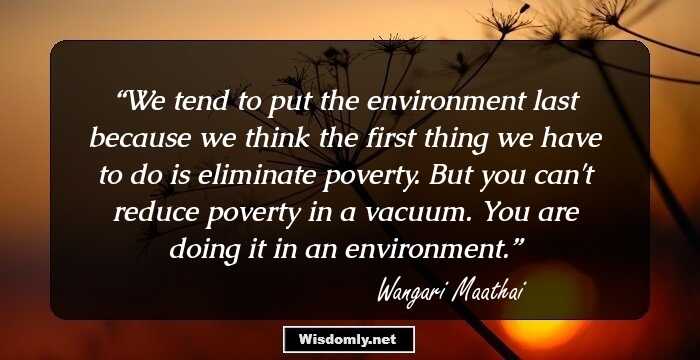
We tend to put the environment last because we think the first thing we have to do is eliminate poverty. But you can't reduce poverty in a vacuum. You are doing it in an environment.
I want to do the right things - I want to plant trees, I want to make sure that the indigenous forests are protected because I know, whatever happens, these are the forests that contain biodiversity, these are the forests that help us retain water when it rains and keep our rivers flowing, these are the forests that many future generations will need.
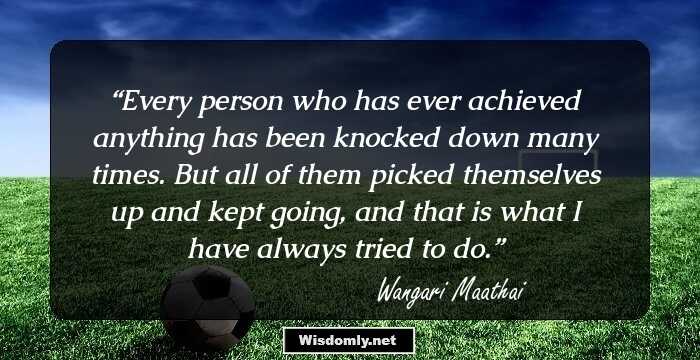
Every person who has ever achieved anything has been knocked down many times. But all of them picked themselves up and kept going, and that is what I have always tried to do.
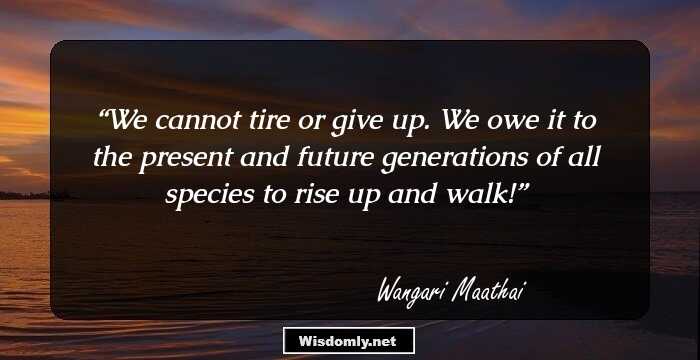
We cannot tire or give up. We owe it to the present and future generations of all species to rise up and walk!
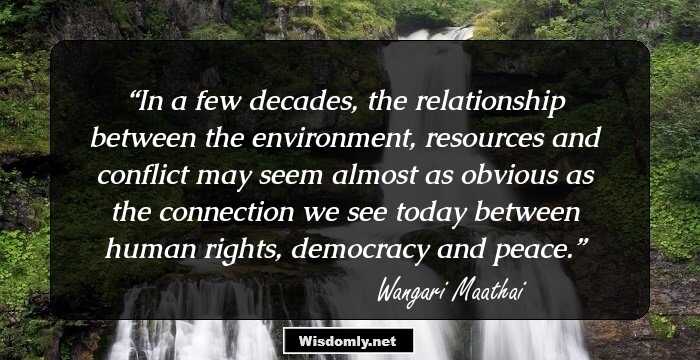
In a few decades, the relationship between the environment, resources and conflict may seem almost as obvious as the connection we see today between human rights, democracy and peace.
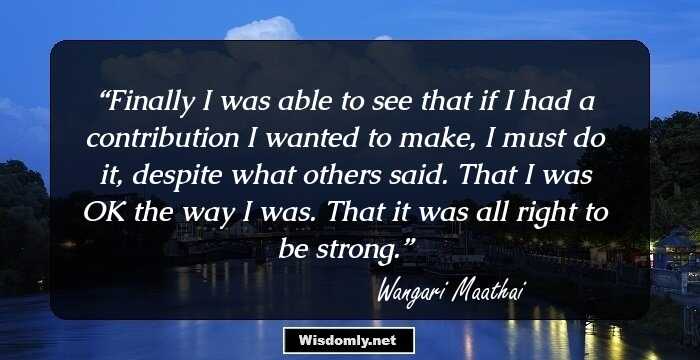
Finally I was able to see that if I had a contribution I wanted to make, I must do it, despite what others said. That I was OK the way I was. That it was all right to be strong.
I stand before you and the world humbled by this recognition and uplifted by the honour of being the 2004 Nobel Peace Laureate. As the first African woman to receive this prize, I accept it on behalf of the people of Kenya and Africa, and indeed the world. I am especially mindful of women and the girl child. I hope it will encourage them to raise their voices and take more space for leadership.
Those of us who witness the degraded state of the environment and the suffering that comes with it cannot afford to be complacent. We continue to be restless. If we really carry the burden, we are driven to action. We cannot tire or give up. We owe it to the present and future generations of all species to rise up and walk!
We can work together for a better world with men and women of goodwill, those who radiate the intrinsic goodness of humankind. To do so effectively, the world needs a global ethic with values which give meaning to life experiences and, more than religious institutions and dogmas, sustain the non-material dimension of humanity. Mankind's universal values of love, compassion, solidarity, caring and tolerance should form the basis for this global ethic which should permeate culture, politics, trade, religion and philosophy. It should also permeate the extended family of the United Nations.
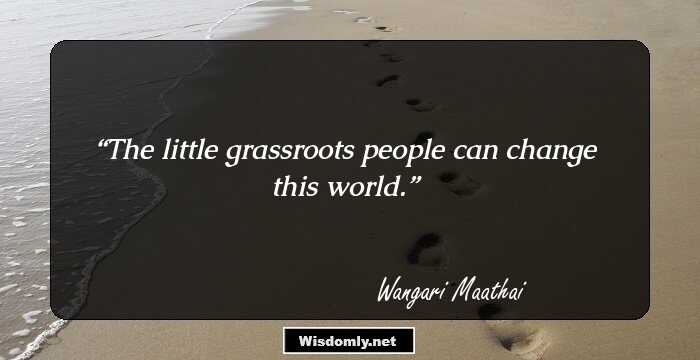
The little grassroots people can change this world.
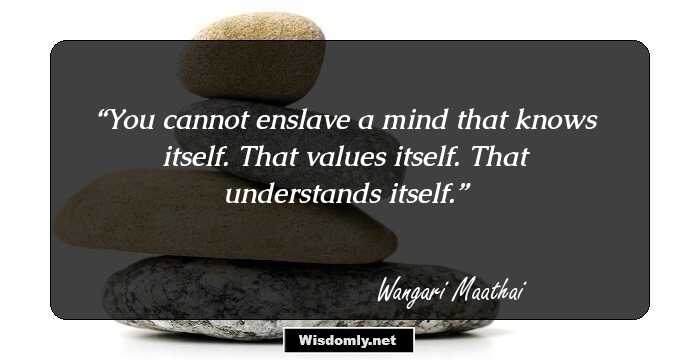
You cannot enslave a mind that knows itself. That values itself. That understands itself.
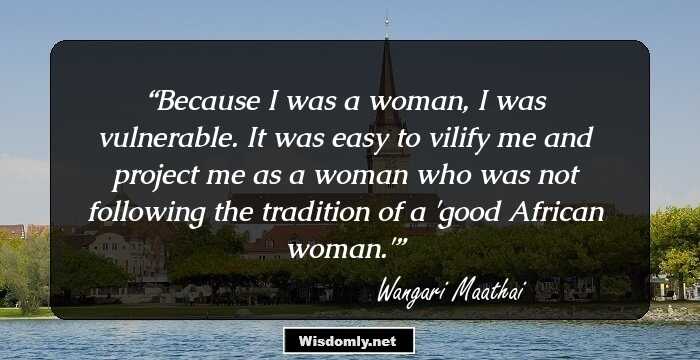
Because I was a woman, I was vulnerable. It was easy to vilify me and project me as a woman who was not following the tradition of a 'good African woman.'
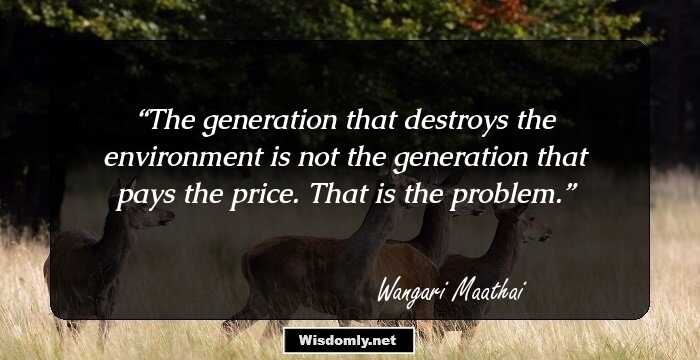
The generation that destroys the environment is not the generation that pays the price. That is the problem.
It is evident that many wars are fought over resources which are now becoming increasingly scarce. If we conserved our resources better, fighting over them would not then occur…so, protecting the global environment is directly related to securing peace…those of us who understand the complex concept of the environment have the burden to act. We must not tire, we must not give up, we must persist.
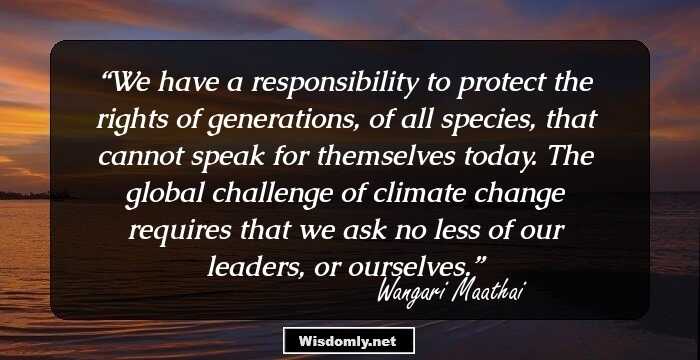
We have a responsibility to protect the rights of generations, of all species, that cannot speak for themselves today. The global challenge of climate change requires that we ask no less of our leaders, or ourselves.
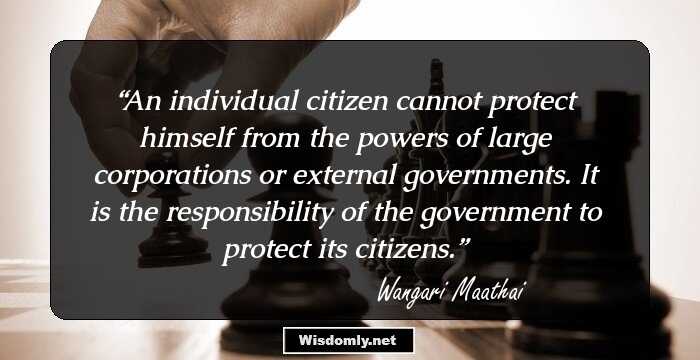
An individual citizen cannot protect himself from the powers of large corporations or external governments. It is the responsibility of the government to protect its citizens.
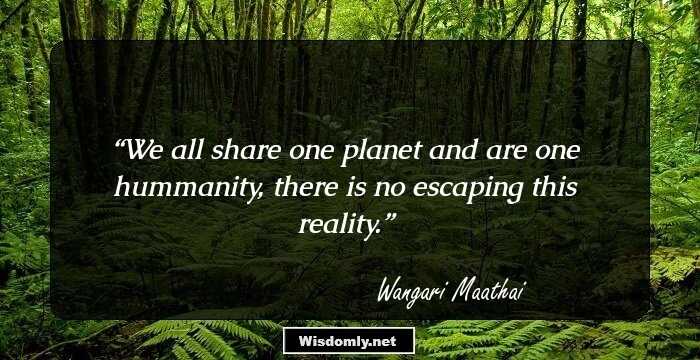
We all share one planet and are one hummanity, there is no escaping this reality.
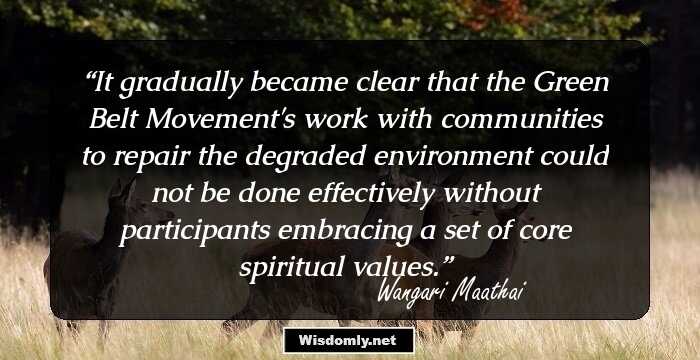
It gradually became clear that the Green Belt Movement's work with communities to repair the degraded environment could not be done effectively without participants embracing a set of core spiritual values.
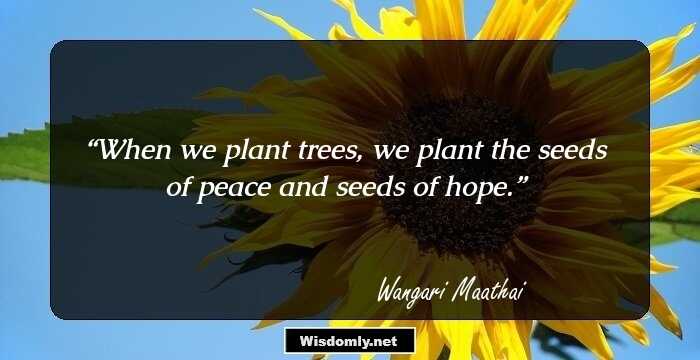
When we plant trees, we plant the seeds of peace and seeds of hope.
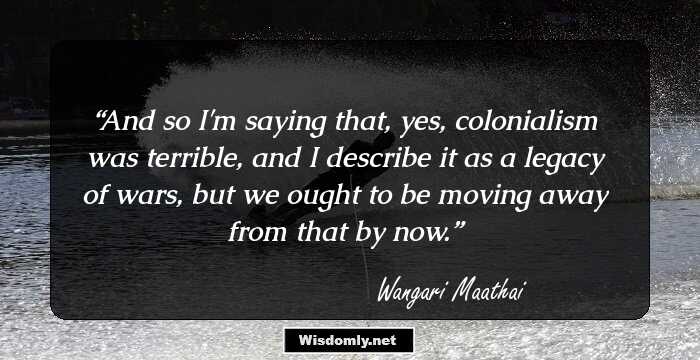
And so I'm saying that, yes, colonialism was terrible, and I describe it as a legacy of wars, but we ought to be moving away from that by now.
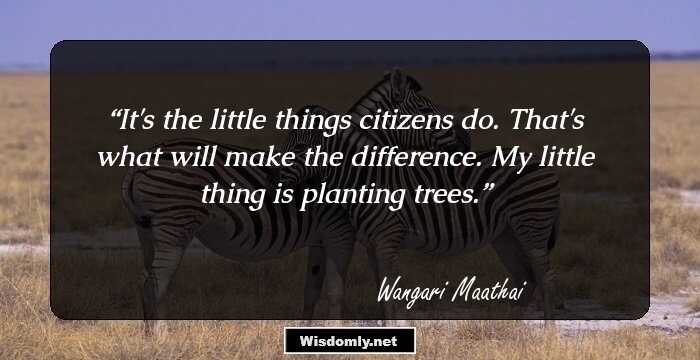
It's the little things citizens do. That's what will make the difference. My little thing is planting trees.
The essential role of the environment is still marginal in discussions about poverty. While we continue to debate these initiatives, environmental degradation, including the loss of biodiversity and topsoil, accelerates, causing development efforts to falter.










